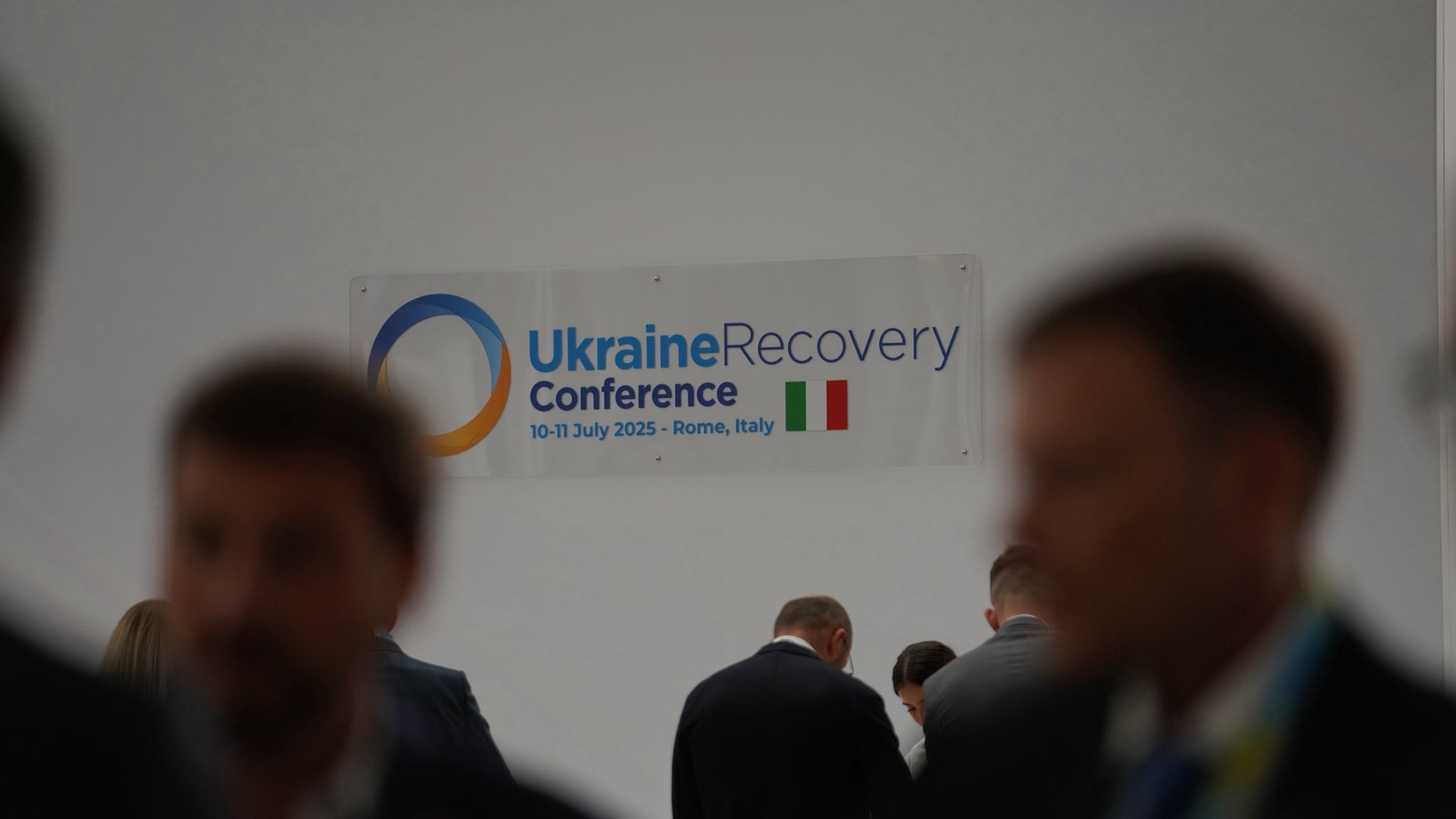- €400 million of new funding and support for Ukraine announced at Ukraine Recovery Conference in Rome
- Commitments bring total EBRD financing deployed in wartime Ukraine to €7.6 billion
- Bank to administer new project preparation facility Ukraine FIRST, accelerating reconstruction and development of vital infrastructure
The European Bank for Reconstruction and Development (EBRD) is strengthening its support for Ukraine’s economy and future reconstruction with a new package of projects, policy and partnerships.
At the Ukraine Recovery Conference (URC) in Rome on 10-11 July, the Bank signed extensive financing and pre-financing agreements that bring total EBRD financing deployed in wartime Ukraine to €7.6 billion.
The EBRD, Ukraine’s largest institutional investor, has significantly increased its financing to the country since Russia launched its full-scale war in February 2022, and aims to continue investing between €1.5 billion to €2 billion a year.
At the URC, the EBRD was active in all four of the conference’s thematic dimensions: EU accession; private-sector business recovery; local, municipal and regional recovery; and social recovery and human capital.
In the area of EU accession, the European Union (EU) agreed to provide €540 million to Ukraine through EBRD programmes under its Ukraine Investment Framework. This will be used to boost the EBRD’s lending to Ukrainian small and medium-sized enterprises, as well as to accelerate the development of renewable energy projects. The agreements were signed by EBRD President Odile Renaud-Basso and EU Commissioner for Enlargement Marta Kos.
Ukraine will also receive extra European support for reconstruction through the new Ukraine Facility for Infrastructure Reconstruction (Ukraine FIRST), which will streamline the planning, financing and implementation of large-scale infrastructure projects. The EBRD, EU and European Investment Bank (EIB) are jointly providing €30 million to the project preparation facility, which will be managed by the EBRD and EIB.
In the business recovery category, the EBRD extended a substantial package of new financial and advisory support:
- A €160 million loan to Ukrainian state-owned oil and gas company Ukrnafta to finance 250 MW of small-scale gas-fired distributed power generation capacity around the country and boost the power sector’s resilience in the face of heavy Russian attacks.
- Two transactions with local banks – a €185 million portfolio risk-sharing facility with Privatbank and an €89.2 million portfolio risk-sharing facility with Ukrgasbank – that will together unlock up to €900 million of new lending by the banks to businesses and households.
- A €100 million financial package to agribusiness products producer MHP with British International Investment and Sweden’s Swedfund, of which the EBRD is lending €40 million.
- A €50 million loan to Ukrainian postal and courier operator Nova Post to finance its 2025-26 investment plans and continued growth.
- A US$ 25 million loan to Ukrainian food retailer Varus to finance its sustainable, energy-efficient expansion.
- A €6.5 million equity investment in FlyerOne Ventures Fund V – a venture capital fund that will invest in early-stage tech companies from Ukraine and across central and eastern Europe. Together with the International Finance Corporation, the EBRD plans to further develop investable private equity initiatives with Ukrainian fund managers to mobilise capital.
- To unlock new renewable energy capacity in Ukraine, the EBRD and development partners are creating a mechanism that will incentivise investments in renewable energy by stabilising revenues for developers. Named the Ukraine Renewable Energy Risk Mitigation Mechanism, it is expected to support up to 1.5 GW of new renewable energy projects, potentially mobilising €2 billion in investments. The Bank also intends to lend €60 million to Galnaftogaz to develop wind energy projects, having signed a mandate letter with the developer at the URC.
- To advance the development of capital markets, the EBRD signed a memorandum of understanding (MoU) with the National Bank of Ukraine, Ukraine’s Ministry of Economy and Ministry of Finance, and the National Securities and Stock Market Commission supporting the creation of a more effective, vertically integrated capital market infrastructure.
To help Ukraine’s cities maintain the provision of essential services amid the ongoing war, the EBRD signed new commitments with local municipalities under the conference’s regional umbrella:
- A €25 million loan to the city of Dnipro to finance energy-saving measures in public buildings. To complement this, the EBRD intends to support the opening of a new Superhumans clinic in the city, which will deliver comprehensive medical and rehabilitation care to war-affected military personnel and civilians. The Bank’s investment is expected to benefit from donor support from the Netherlands.
- A €10 million loan to Lviv to rehabilitate two wastewater plants, and a €10 million emergency liquidity loan to Kharkiv to mitigate the effects of the war on the city’s financial position and ensure uninterrupted essential municipal services.
- A pre-financing agreement with the city of Kyiv that consolidates plans for a €150 million loan for new metro trains.
- Agreements to finance new trolleybuses in Ternopil and Mykolaiv, which are benefiting from donor support from the EU, Spain, Canada, Italy and the United States.
- MoUs with the Ministry for Development to cooperate on creating a pipeline of priority road infrastructure projects and with the Ministry of Agrarian Policy and Food to invest in sustainable irrigated agriculture to boost crop production. The EBRD is exploring restoring two old irrigation systems near Odessa to support food security for Ukraine’s future reconstruction.
Under the umbrella of human capital, the EBRD and Ukraine’s Ministry of Economy launched a new Human Capital Resilience Charter to help employers support returnee workers and veterans in meeting the challenges they face in the wartime labour market. The EBRD joined major Ukrainian employers in signing the charter, reaffirming the Bank’s commitment to delivering the human capital recovery and long-term resilience that Ukraine needs.




